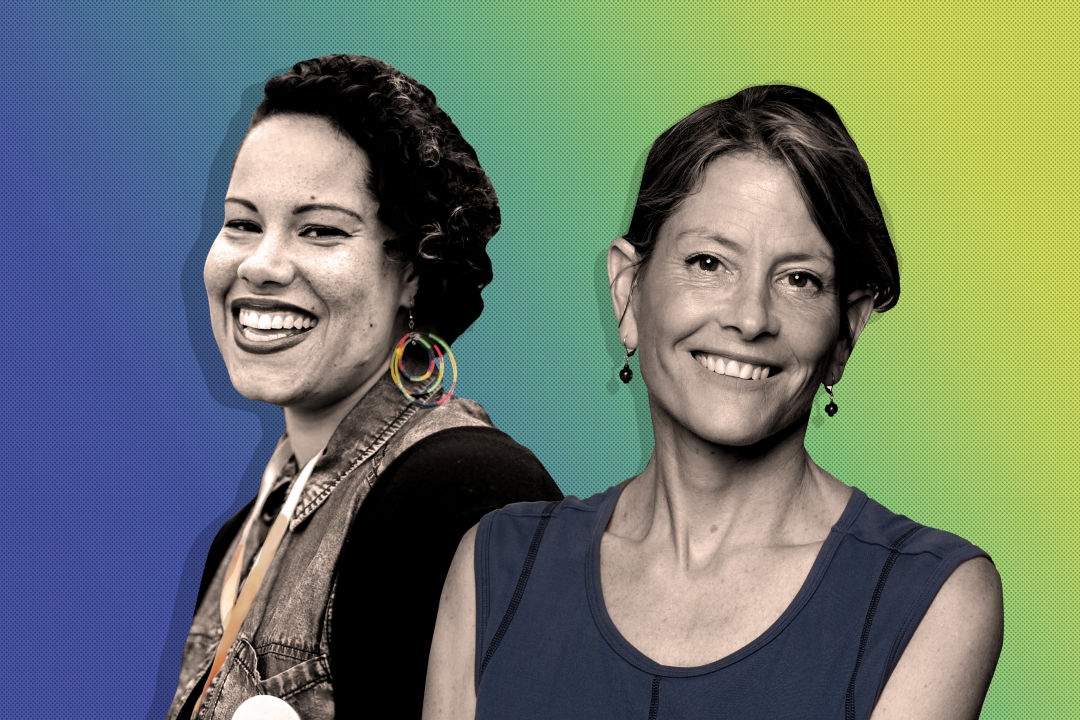This Election Race Is (Probably) Going to Be Seattle’s Tightest

Few votes, but many opinions, separate Nikkita Oliver and Sara Nelson.
Polls may not be perfect, but they’re often telling. And the most recent temperature check of Seattle’s electorate is telling us that one city council race is going to be quite close.
Only four points separate Sara Nelson and Nikkita Oliver as they vie for the seat surrendered by mayoral candidate M. Lorena González, according to the Northwest Progressive Institute. The survey of 617 voters conducted by Change Research on behalf of NPI in mid-October has a 4.1 percent margin of error, so the gap between the two candidates may be even narrower than the result suggests. “The race may or may not end up in recount territory, but regardless of whether it does or not, it looks like it will be the closest of the four citywide races,” observes Andrew Villeneuve, the think tank’s founder.
It was certainly tight in August’s primary, when Oliver eked out a first-place finish over Nelson by less than one percentage point. That result only added to the race’s intrigue. While the other citywide council competition—between incumbent Teresa Mosqueda and structural engineer Kenneth Wilson—has remained a bit of a snooze, the contest between Nelson and Oliver has played out as a clash of two high-profile community figures representing different factions of Seattle’s progressive milieu.
Oliver, a lawyer and community organizer, has been one of the most influential voices in local politics since a grassroots mayoral run came up short in 2017. The executive director of Creative Justice, a nonprofit providing an arts-based alternative to youth incarceration, has led conversations about systemic racism and police abolition in the aftermath of George Floyd’s murder. They have backed defunding the police, citing a National Institute for Criminal Justice Reform study that found many calls to the Seattle Police Department didn’t require an officer response, to reallocate dollars toward affordable housing projects, childcare, and support for children.
Nelson, meanwhile, is the cofounder of one of the city’s most popular breweries (Fremont Brewing) and something of a wonk—she’s billing herself as the “get things done” candidate after spending years as a legislative advisor to city council member Richard Conlin (she also ran for city council in 2017, placing third in the primary). As a small business owner, she wants to see business-and-occupation tax collection suspended and more relief money sent to neighborhood business districts, where she hopes to curb break-ins. But her approach to public safety drastically differs from Oliver’s. She doesn’t advocate for defunding the police, instead pushing for more accountability and training.
The candidates rather succinctly summarized their differences during a “wild card” portion of a debate last week hosted by Rainier Avenue Radio in partnership with Converge Media and the South Seattle Emerald. Oliver and Nelson addressed each other directly, with Oliver calling Nelson a “law and order” candidate and the brewery owner referring to her opponent as an “abolitionist.”
Those words resonate differently across Seattle’s political spectrum, which city council positions tend to frame. Engendering everything from progressive plaudits to comment section profanities to sentences beginning “I’m a progressive, but—” (Seattle may lead in this category), the legislative body has become something of a third-rail for polite conversationalists.
Nelson has been quick to criticize it. Her endorsements, she stresses, are from the council’s “old guard” (though current member Alex Pedersen has backed her). Oliver approaches the current council’s performance more delicately. They’ve seen how the council’s progressive policies “do and do not unfold in terms of changing the material conditions of our most vulnerable and marginalized residents.” At the same time, they’ve touted endorsements from Mosqueda and city council member Tammy Morales.
Lately, much of the commentary on the city council has been filtered through the mayoral race between González, the current council prez, and Bruce Harrell. But Harrell isn’t an outsider. He held the same position as González as recently as 2019, and they voted very similarly on most legislation; he can only distance himself so much from the roots of City Hall’s most recent policies.
So, with the Mosqueda-Wilson race something of an afterthought, the real referendum on this controversial iteration of city council may be the Nelson-Oliver vote. In a Crosscut Elway Poll this September, Nelson supporters indicated that they didn’t feel well-represented in city government, whereas Oliver voters felt the opposite. We’ll probably have to wait well past Election Day to see if that discrepancy, and Nelson’s lead, hold.




